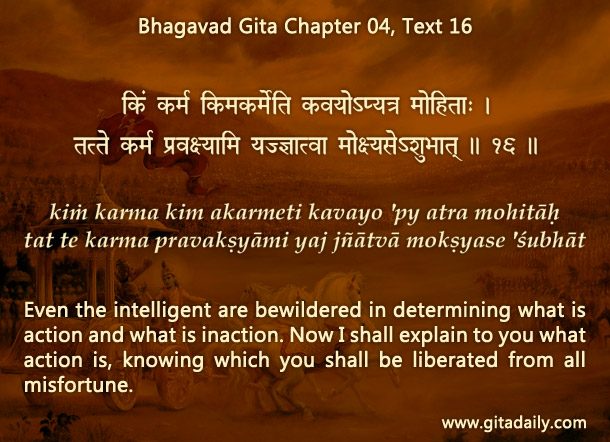When we study the Bhagavad-gita teachings on karma, we may often read into it ideas that are prevalent in contemporary conceptions about karma. Such ideas may not be at all present in the Gita itself — and may be opposite to the thrust of its teachings on karma. One such contemporary idea is that karma induces within us a sense of resignation and fatalism. We may start believing that whatever is going to happen in our life is already destined by our past karma, and our present actions won’t make any difference.
The thrust of the Gita could not be more different. While it’s true that many of the present situations we encounter are unavoidable consequences of our past karma, the Gita is still emphatic that our present actions do matter. In fact, Arjuna sought the wisdom of the Gita specifically because he considered his actions to be consequential — so consequential in fact that he was ready to keep everyone waiting in the middle of a battlefield till he was sure what the right course of action for him was.
Karma as presented in the Gita is forward-looking, not backward-looking. The Gita’s emphasis is not that we have done some past actions whose consequences we must endure inevitably in our present situations; its emphasis is that we can, by our present actions, create a better, brighter future, no matter how dark the present seems or how limited our current choices appear. Pertinently, the Gita assures that understanding karma will remove inauspiciousness from our life (04.16).
The Gita’s presentation of karma contributes to its overall message of hope, positivity, and encouragement. The Gita empowers us with a sense of agency, assuring us that we can make a positive difference not just in our own lives but also in lives of those around us. Its timeless wisdom stands ready to guide us all in taking responsibility for creating that better future.
It is this underlying sense of empowerment that transforms Arjuna from his paralyzed and confused state at the start of the Gita (02.01) to an energized and confident state by the end of the Gita (18.73). The Gita stands ready to similarly transform all of us, inspiring and empowering us to face whatever battles life sends our way.
Summary:
The philosophy of karma assures us that our actions matter — its thrust is not that we accept our present situations with resignation, but that we take our present decisions with responsibility.
Think it over.
- What is a common misreading of the implication of the idea of karma?
- How does the Gita falsify this mistaken reading of karma?
- How can understanding karma properly transform us positively?
***
04.16: Even the intelligent are bewildered in determining what is action and what is inaction. Now I shall explain to you what action is, knowing which you shall be liberated from all misfortune.
Audio explanation of the article is here: https://gitadaily.substack.com/p/karma-resignation-or-responsibility

To know more about this verse, please click on the image

Leave A Comment